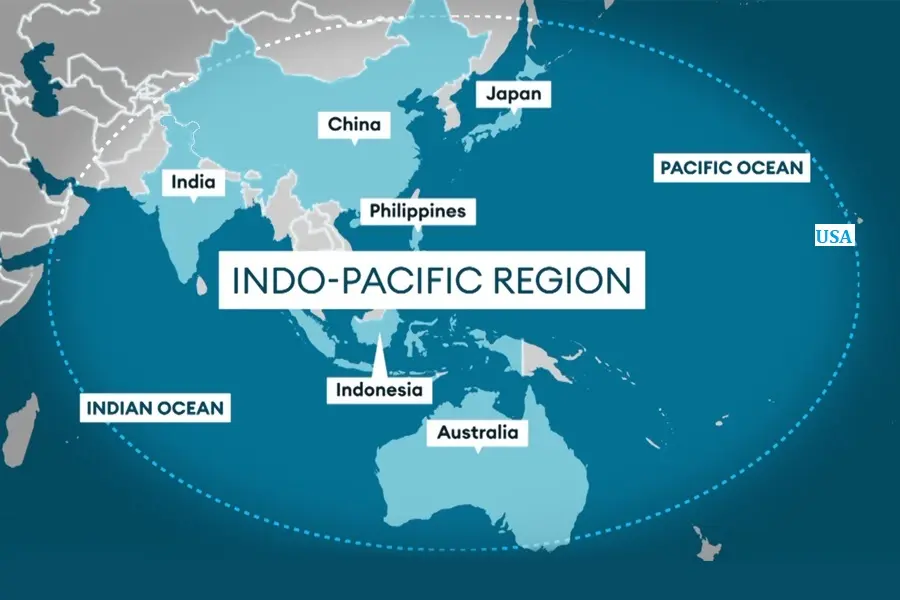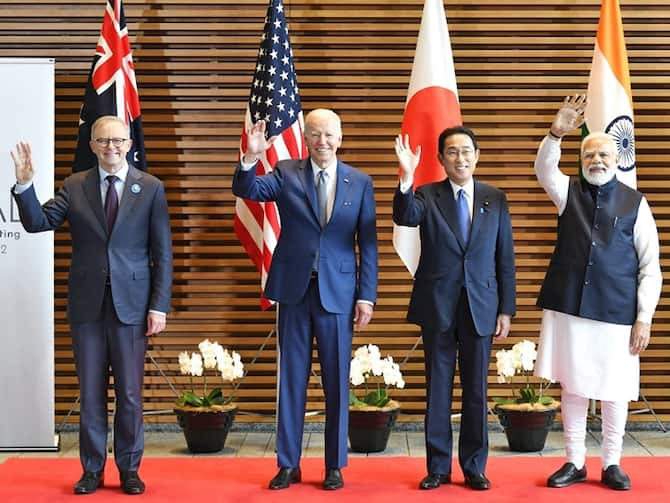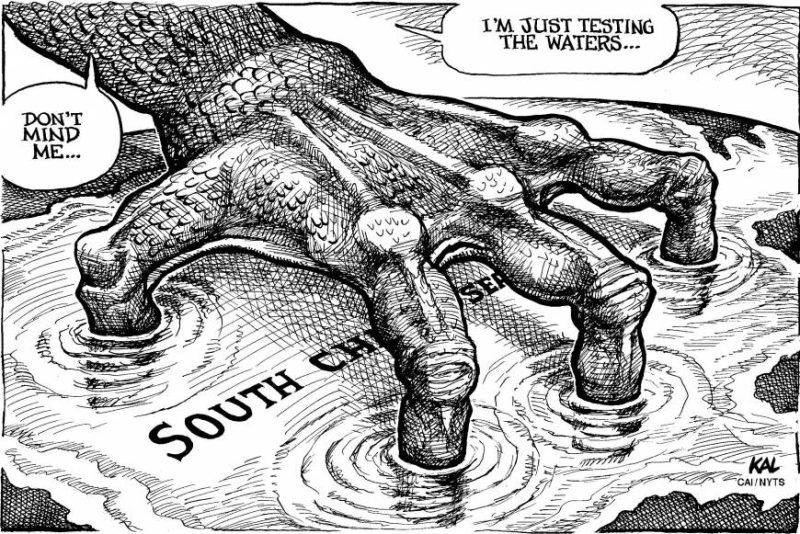Navy Chief’s Warning On Disputes In Indo-Pacific Region Could Escalate Urgent Call for Collective Action by Like-Minded Nations; Why The Indo-Pacific Region Holds Much Significance
The Indo-Pacific region stands at the forefront of global affairs, signifying a convergence of strategic, geopolitical, and economic dynamics that holds much power to shape the trajectory of the 21st century. Thus, comprising a vast expanse of maritime domains and hosting major global powers, this region has become a focal point for international attention and strategic calculations—the multifaceted significance of the Indo-Pacific, dissecting its military importance, geopolitical complexities, and economic vibrancy and understanding the intricacies of this dynamic region is essential for deciphering the evolving equation of global power relations and security considerations.

Indo-Pacific tensions have the potential to escalate into conflicts, warned Chief of Naval Staff Admiral R Hari Kumar on Friday, emphasising the need for collaborative efforts among like-minded nations.
Amid global concerns regarding China’s increasing military assertiveness in the region, Admiral Kumar stated that disputes could spiral out of control.
Speaking ahead of Navy Day on December 4, he highlighted India’s vigilant monitoring of Chinese activities in the Indian Ocean, detailing the deployment of surveillance assets, ships, aircraft, submarines, and drones to enhance its presence.
The Chief of Naval Staff stressed the importance of keeping extra-regional forces, particularly China, under observation to understand their activities and intentions in the Indian Ocean, emphasising the need to deploy surveillance assets and various naval resources to stay informed about developments.
Regarding the broader Indo-Pacific context, Admiral Kumar urged all like-minded nations to collaborate in order to maintain peace and stability. He acknowledged the multitude of challenges in the region, ranging from disputes that could lead to conflict to issues such as illegal migration, fishing, piracy, drug trafficking, and climate change.
At the same time, Admiral Kumar stated the need for dialogue to ensure peace and tranquillity in the Indo-Pacific while advocating for a rules-based approach to the use of oceans and shared responsibility of like-minded nations in fostering a free, open, and inclusive Indo-Pacific, stating that no single force, regardless of size, can effectively address the region’s challenges.

Addressing China’s presence in the Indian Ocean, Admiral Kumar revealed that six to eight Chinese ships, along with numerous fishing vessels and research platforms, operate in the area and spoke about the ongoing monitoring of their activities to maintain situational awareness.
According to Admiral Kumar, maintaining credible deterrence and preparedness for war at sea remain top priorities for the Indian Navy; the commitment of the Indian Navy to the government’s ‘Atmanirbhar Bharat’ (self-reliant India) approach as well as the importance of closely monitoring the intentions, messaging, behavioural characteristics, and transparency of actors and forces operating in the areas of interest.

Why is the Indo-Pacific region so vital from a military standpoint, geopolitical influence, and economic prospects?
The Indo-Pacific region holds major importance on the global stage, with its significance extending across military, geopolitical, and economic dimensions; thus, understanding the multifaceted nature of this region is essential to gauge its strategic value.
1. Military Significance –
From the military standpoint, the Indo-Pacific region is critical due to the presence of major global powers, including the United States, China, India, Japan, and Australia.
The region’s vast maritime expanse serves as a vital corridor for international trade and energy routes, and control over critical maritime chokepoints, such as the South China Sea, Malacca Strait, and the Indian Ocean, can significantly influence military dominance and access to vital resources.
Moreover, the region witnesses heightened military activities, territorial disputes, and strategic posturing.
Thus, nations in the Indo-Pacific, particularly those with territorial claims or interests, invest heavily in naval capabilities to safeguard their maritime interests and ensure freedom of navigation. The proximity of military forces and the potential for power projection make the Indo-Pacific a focal point for global security considerations.

2. Geopolitical Significance –
The Indo-Pacific is a geopolitical crossroads where major powers intersect, leading to complex relationships and complicated geopolitics.
The rise of China as a global power has further swayed the region’s sensitivity, with its assertive territorial claims in the South China Sea and ambitions to establish influence across the region through initiatives like the Belt and Road Initiative (BRI) prompting responses and alignments among other regional players and global actors.
Hence, geopolitically, the Indo-Pacific is characterised by shifting alliances, competition for influence, and efforts to balance power dynamics. The geopolitical implications of control over maritime routes, access to resources, and the potential for shaping regional and global governance further accentuate the region’s strategic importance.
3. Economic Prospects –
The Indo-Pacific is an economic powerhouse and home to some of the world’s fastest-growing economies; its coastal states are principal contributors to global trade, with critical sea lines of communication facilitating the movement of both goods and resources.
The region’s economic vitality is illustrated by the presence of crucial shipping routes, abundant natural resources, and rapidly expanding markets. As a result, economic considerations play a vital role in the strategic calculations of nations in the Indo-Pacific.
Hence, infrastructure development, trade partnerships, and economic integration are vital components of regional dynamics. The economic prosperity of the Indo-Pacific is intertwined with global financial stability, making it a focal point for international trade and investment.

Countries in the Indo-Pacific Region –
The Indo-Pacific region includes many nations, each contributing to the region’s economic and strategic significance; some of the major players in the region are –
1. China- As the world’s second-largest economy, China’s economic and military influence in the Indo-Pacific is pivotal. Its Belt and Road Initiative (BRI) aims to enhance regional infrastructure connectivity, amplify economic ties, and foster geopolitical influence – initiatives that have economic powers like the U.S., Japan, and India wary.
2. India- As a rapidly growing economy, India holds strategic importance in the Indo-Pacific. Its geographic location facilitates control over key sea routes, and as mentioned in the earlier part of the article, the Indian Navy plays a crucial role in safeguarding maritime interests.
3. United States- A traditional maritime power, the U.S. maintains a significant military presence in the Indo-Pacific, ensuring the security of sea lanes and its economic ties with regional partners underpin stability and prosperity.
4. Japan- A technological and economic powerhouse, Japan’s economy is deeply intertwined with regional trade, and Japan’s Self-Defense Forces contribute to regional security and stability.
5. Australia- Another major player in the Indo-Pacific, Australia’s economy is export-driven, with a strong focus on natural resources. The Australian Defense Force is vital to regional security and contributes to global peacekeeping efforts.
6. Indonesia- As a Southeast Asian nation, Indonesia‘s archipelagic geography positions it at the crossroads of major shipping routes, influencing its economic and strategic significance. The Indonesian military is pivotal in safeguarding maritime interests.
6. South Korea- A technologically advanced economy, South Korea relies on secure sea lanes for trade. Its military capabilities contribute to regional stability, particularly in addressing security concerns on the Korean Peninsula.

Economic Dependence
The economies of Indo-Pacific countries are deeply entwined, with the region serving as a hub for global trade and commerce. Sea routes in the South China Sea and the Indian Ocean facilitate the movement of goods, energy resources, and raw materials.
Countries like China, Japan, and South Korea heavily depend on these routes for imports and exports, sustaining their manufacturing and export-oriented economies. The economic success of nations in the region is intrinsically linked to the stability and security of maritime trade routes.
Military Dependence
Given the maritime nature of the Indo-Pacific, countries in the region heavily rely on their naval capabilities to protect national interests and ensure regional stability.
The presence of powerful navies, such as the U.S. Seventh Fleet, Indian Navy, and China’s People’s Liberation Army Navy, emphasises the strategic importance of maritime forces.
Since, Naval assets are crucial for securing sea lanes, responding to territorial disputes, and addressing potential security threats, making military capabilities a cornerstone of regional stability.
The Last Bit, there is little doubt that when it comes to global geopolitics, the Indo-Pacific region emerges as a linchpin, where the lines of military strategies, geopolitical alignments, and economic ambitions all come together.
Its significance transcends mere geographical boundaries, extending into the critical arena of global security and economic stability. As major powers steer the strategic waters of the Indo-Pacific, the region becomes a crucible for testing alliances, managing tensions, and forging a new order.
The Indo-Pacific’s dynamic nature, characterised by shifting power dynamics and economic vitality, also highlights its pivotal role in shaping the future contours of an interconnected world with nations vying for a prominent space in this crucial expanse, the Indo-Pacific remains a crucible of opportunities and challenges that define the delicate balance of this region.




